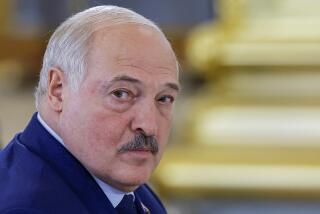Belarus President Claims Referendum Victory
MOSCOW — Bucking a democratic and reformist trend in what was Soviet-dominated Eastern Europe, the president of Belarus claimed victory Monday in a fraud-tainted referendum that proposed restarting his five-year term with sweeping new powers.
In two weeks of balloting that ended Sunday, election officials said, 70.5% of registered voters endorsed constitutional changes giving President Alexander G. Lukashenko more control over parliament and the Constitutional Court, which had resisted his aspiring autocracy.
As Lukashenko moved to begin restructuring both rival branches of government, their leaders called meetings for today to try to impeach him. But the opposition appeared tired, demoralized and unlikely to muster the votes or the crowds to prevail.
“It will be very hard for my opponents to insist there were violations, that the referendum was illegal,” a defiant Lukashenko told reporters in Minsk, the Belarussian capital. “The overwhelming majorities [favoring] all the president’s questions speak for themselves.”
Parliament Chairman Semen Sharetsky called the outcome a “farce” but admitted that no one inside the former Soviet republic of 10 million people is likely to overturn it. “I want to ask the world community,” he pleaded, “not to allow a dictatorship here.”
Unlike the urbane progressives voted into power in Bulgaria, Romania and Lithuania in recent weeks, Lukashenko is a former Soviet army indoctrination officer and collective-farm chief with a populist tongue, a disdain for market economics and a liking for Soviet-style governance.
Promising to send corrupt politicians to the Himalayas with no time to pack, he won the presidency in a 1994 landslide. The tall, mustachioed leader remains popular among rural, elderly voters who believe that his campaign to restore a mini-Soviet Union through merger with Russia will reverse the free fall of their unreformed economy.
His foes view him as scary, unpredictable and a bit unbalanced. He once called Felix Dzerzhinsky, founder of the Soviet secret police, one of his heroes and said he needed powers like those wielded by Adolf Hitler.
Lukashenko has worked with boundless energy to consolidate his authority--switching off all private broadcast media, freezing bank accounts of critical newspapers, banning independent trade unions and ordering that no rallies be held during harvest season.
“There is a certain pathology to Lukashenko,” said Peter Byrne, head of the Belarus branch of the New York-based Open Society Foundation. “If there is opposition, his mental process dictates that he has to overrun it.”
In customary Lukashenko style, the text of the constitutional amendments he asked voters to approve Sunday has been seen by practically nobody.
But this much is known: While extending his rule to 2001, the changes will allow him to remove 89 of the current parliament’s 199 members and name six members to a new 60-seat upper house.
Sunday’s official returns had voters rejecting an alternative proposal by parliament to abolish the presidency. Voters also elected to keep the death penalty; to allow Lukashenko to continue appointing local leaders; and to maintain a ban on the free sale and purchase of land, officials said.
Lukashenko’s new Constitutional Court will be made up of six judges appointed by the president and six elected by the lower house.
The current court has ruled 11 of Lukashenko’s decrees unconstitutional. Lukashenko has ignored its rulings, turning Belarus into what the court chairman called the “Chernobyl of law.” When the judges declared that Lukashenko could not amend the constitution with Sunday’s referendum, he overruled them with yet another decree.
The grab for power stirred a wave of protest that threatened to boil over against the president, whose popularity ratings had slipped to 40% in recent opinion polls. But he used television and a 120,000-member police force to overwhelm and intimidate his foes. Under rumored threats of attack dogs, tear gas and even snipers, opposition leaders were never able to muster more than 5,000 demonstrators at any one rally.
Lawmakers and independent observers said the 84% turnout officially reported Sunday was inflated. They noted that the number of voters who cast referendum ballots exceeded the number who voted for the scattered lawmakers up for election by 20% to 50%.
Members of the European Parliament who monitored the vote reported hundreds of irregularities.
More to Read
Sign up for Essential California
The most important California stories and recommendations in your inbox every morning.
You may occasionally receive promotional content from the Los Angeles Times.










